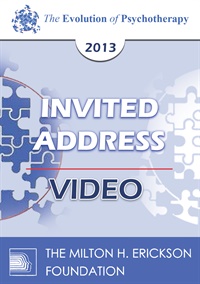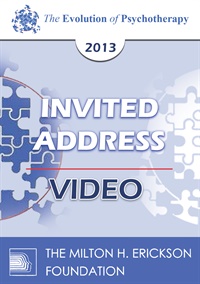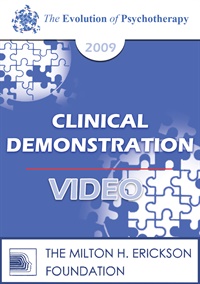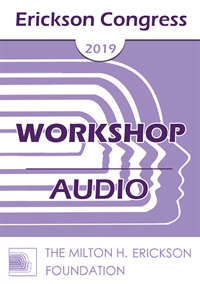
- Average Rating:
- Not yet rated
- Topic Areas:
- Workshops | Love | Brief Therapy | Motivation | Solution Oriented Approach | Therapist Development
- Categories:
- Erickson Congress | Erickson Congress 2019
- Faculty:
- Michael Munion, MA, LPC
- Duration:
- 1 Hour 31 Minutes
- Format:
- Audio Only
- Original Program Date:
- Dec 15, 2019
- Short Description:
- This workshop provides a framework for assessing clients along two important dimensions that impact therapeutic outcome: motivation and sense of agency (one’s perception of their ability to create change in their own lives). This assessment fosters interventions that enhance the capacity for strategic interventions to be truly brief and solution focused. The participant in this workshop will have the opportunity to observe and practice this approach.
- Price:
- $15.00 - Base Price
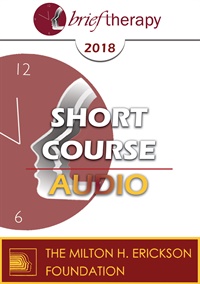
- Average Rating:
- Not yet rated
- Topic Areas:
- Short Courses | Brief Therapy | Motivation | Utilization
- Categories:
- Brief Therapy Conference | Brief Therapy Conference 2018
- Faculty:
- John Lentz, D. Min.
- Duration:
- 1:29:35
- Format:
- Audio Only
- Original Program Date:
- Dec 06, 2018
- Short Description:
- While this workshop teaches useful tools for brief therapy, it also will give participants positive experiences for themselves. This workshop evokes experiences that lead clients to discover solutions that work. Whether the client experiences their solution, or has a dramatic shift in understanding their options it often leads to motivation and success.
- Price:
- $15.00 - Base Price
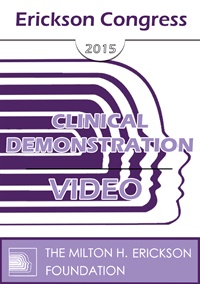
- Average Rating:
- Not yet rated
- Topic Areas:
- Clinical Demonstrations | Therapist Development | Treatment Planning | Brief Therapy | Motivation
- Categories:
- Erickson Congress | Erickson Congress 2015
- Faculty:
- Michael Munion, MA, LPC
- Course Levels:
- Master Degree or Higher in Health-Related Field
- Duration:
- 00:54:00
- Format:
- Audio and Video
- Original Program Date:
- Dec 10, 2015
- Short Description:
- Change potential is enhanced by creating success experience during the therapeutic encounter, and by developing individualized tools to reinforce change on an ongoing basis. This demonstration assesses personal resources, motivation, and develops an individualized change plan.
- Price:
-
Sale is $29.00
price reduced from Base Price - $59.00
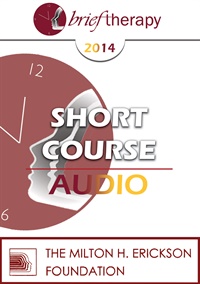
- Average Rating:
- Not yet rated
- Topic Areas:
- Short Courses | Brief Therapy | Therapeutic Relationship
- Categories:
- Brief Therapy Conference | Brief Therapy Conference 2014
- Faculty:
- Norma Barretta, PhD | Phillip Barretta, MA, MFT
- Duration:
- 1:12:29
- Format:
- Audio Only
- Original Program Date:
- Dec 11, 2014
- Short Description:
- This short course explores how therapists build a strong, flexible therapeutic alliance by working with perception, response patterns, and personal power. Participants learn practical ways to read nonverbal cues, use mirroring and language patterns, and engage trance states without formal induction. Through experiential exercises and live demonstration, the session shows how awareness, choice, and anchored resources support confidence, resilience, and meaningful change in both clients and clinicians.
- Price:
- $15.00 - Base Price
EP13 Invited Address 17 – Motivational Interviewing and The Language of Change – William Miller, PhD
- Average Rating:
- Not yet rated
- Topic Areas:
- Invited Addresses | Interviewing | Therapist Development | Motivation | Psychotherapy
- Categories:
- Evolution of Psychotherapy | Evolution of Psychotherapy 2013
- Faculty:
- William Miller, PhD
- Course Levels:
- Master Degree or Higher in Health-Related Field
- Duration:
- 53:56
- Format:
- Audio and Video
- Original Program Date:
- Dec 15, 2013
- Short Description:
- Motivational interviewing facilitates a natural process of “talking oneself into change.” Dr. Miller will provide an overview of the clinical method of motivational interviewing and its underlying psycholinguistic processes, based on recent research linking therapist and client in-session speech to behavioral outcomes. These dynamics appear to predict successful outcomes across a variety of psychotherapies.
- Price:
-
Sale is $29.00
price reduced from Base Price - $59.00
- Average Rating:
- Not yet rated
- Topic Areas:
- Invited Addresses | Psychotherapy | Research | Resistance | Motivation
- Categories:
- Evolution of Psychotherapy | Evolution of Psychotherapy 2013
- Faculty:
- David Burns, MD
- Course Levels:
- Master Degree or Higher in Health-Related Field
- Duration:
- 59:00
- Format:
- Audio and Video
- Original Program Date:
- Dec 14, 2013
- Short Description:
- New research indicates that motivation influences how we think, feel, and behave, as much as cognitions, and that the failure to address resistance is the cause of most therapeutic failure. Dr. Burns will describe the eight most common forms of resistance and present powerful new techniques to melt away resistance before using any cognitive, behavioral, or interpersonal techniques.
- Price:
-
Sale is $29.00
price reduced from Base Price - $59.00
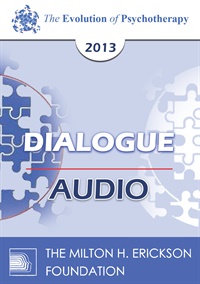
- Average Rating:
- Not yet rated
- Topic Areas:
- Psychotherapy | Dialogues | Acceptance and Commitment Therapy (ACT) | Interviewing | Motivation
- Categories:
- Evolution of Psychotherapy | Evolution of Psychotherapy 2013
- Faculty:
- Steven Hayes, PhD | William Miller, PhD
- Duration:
- 1 Hour 6 Minutes
- Format:
- Audio Only
- Original Program Date:
- Dec 13, 2013
- Short Description:
- EP13 Dialogue 12 – Acceptance & Commitment Therapy and Motivational Interviewing – Steven Hayes, PhD and William Miller, PhD Moderator: Robert Bohanske, PhD Educational Objectives: Given a topic, describe the differing approaches to psychotherapy, and identify the strengths and weaknesses of each approach.
- Price:
- $15.00 - Base Price
- Average Rating:
- Not yet rated
- Topic Areas:
- Workshops | Psychotherapy | Therapeutic Relationship | Cognitive Behavior Therapy (CBT)
- Categories:
- Evolution of Psychotherapy | Evolution of Psychotherapy 2013
- Faculty:
- Judith Beck, PhD
- Course Levels:
- Master Degree or Higher in Health-Related Field
- Duration:
- 3:04:03
- Format:
- Audio and Video
- Original Program Date:
- Dec 12, 2013
- Short Description:
- This workshop takes on the challenge of applying cognitive therapy to clients whose problems feel diffuse, chronic, or hard to pin down. The material moves through how therapists clarify goals, build a shared case formulation, and stay effective when symptoms shift, motivation wavers, or progress feels slow. Clinical examples show how structure, collaboration, and guided discovery help bring focus and momentum to treatment, even when cases don’t fit neat diagnostic boxes.
- Price:
-
Sale is $29.00
price reduced from Base Price - $59.00
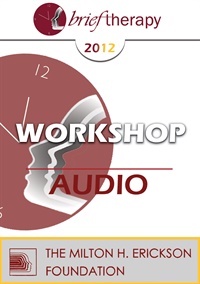
- Average Rating:
- Not yet rated
- Topic Areas:
- Workshops | Marriage
- Categories:
- Brief Therapy Conference | Brief Therapy Conference 2012 | Pioneers in Couples and Family Therapy
- Faculty:
- Michele Weiner-Davis, LCSW
- Duration:
- 2:25:13
- Format:
- Audio Only
- Original Program Date:
- Dec 08, 2012
- Short Description:
- This session presents a structured framework for working with one partner to effect change in the couple system. It explores clinical opportunities when only one partner engages in therapy, emphasizing goal orientation, behavior shifts, and communication patterns. Grounded in real cases, the approach encourages creative, actionable strategies to strengthen relationships—even when partners differ in readiness.
- Price:
- $15.00 - Base Price
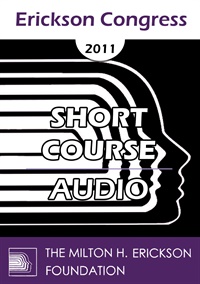
- Average Rating:
- Not yet rated
- Topic Areas:
- Hypnotherapy | Short Courses | Communication | Utilization
- Categories:
- Erickson Congress | Erickson Congress 2011
- Faculty:
- Erika Chovanec, PhD
- Duration:
- 1:20:56
- Format:
- Audio Only
- Original Program Date:
- Dec 09, 2011
- Short Description:
- This workshop will introduce a holistic-motivational approach toward hypnotherapy, inspired by the work of Abraham Maslow. It will use lecture and demonstrations to show how hypnotherapy can aid in the utilization and encouragement of what Maslow would call Being Motivation and Being Values in order to create lasting solutions. Participants will also learn specific forms of Ericksonian communication that may enhance Being Motivation and Being Values.
- Price:
- $15.00 - Base Price
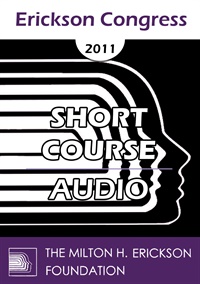
- Average Rating:
- Not yet rated
- Topic Areas:
- Short Courses | Children and Adolescent Therapy | Family Therapy | Strengths-Based
- Categories:
- Erickson Congress | Erickson Congress 2011
- Faculty:
- Bob Bertolino, PhD
- Duration:
- 1:28:56
- Format:
- Audio Only
- Original Program Date:
- Dec 09, 2011
- Short Description:
- Agencies are under pressure to prove results, reduce dropout, and still stay human. In this practical and engaging session, Bob Bertolino outlines a strength-based framework that blends outcome monitoring, alliance feedback, cultural responsiveness, and the best available research. Drawing from real agency data, he shows how tracking client progress in real time can improve effectiveness, lower dropout, strengthen staff morale, and keep services focused on what actually works.
- Price:
- $15.00 - Base Price
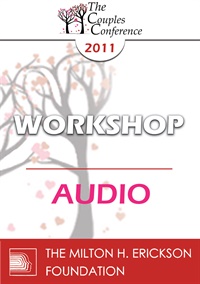
- Average Rating:
- Not yet rated
- Topic Areas:
- Couples Therapy | Workshops | Motivation | Neurobiology | Therapist Development
- Categories:
- Couples Conference | Couples Conference 2011
- Faculty:
- Jette Simon
- Duration:
- 1:41:46
- Format:
- Audio Only
- Original Program Date:
- Apr 01, 2011
- Short Description:
- Knowing how to elicit positive emotion even in couples steeped in intensely negative interactions is the key to providing the motivation for change. In this workshop, we’ll explore a variety of ways for creating “magical moments” in the therapy hour that offer a new template for couples, otherwise trapped in dysfunction, to allay repetitive cycles. You’ll learn how to use tools like focusing, sentence stems, doubling and directives to invite couples into new kinds of experience of connection. We’ll also examine the neurobiological principles that enable partners to expect and attract more positive experiences from each other.
- Price:
- $15.00 - Base Price
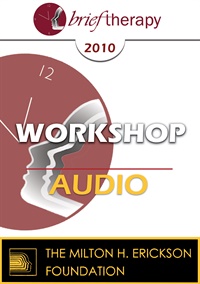
- Average Rating:
- Not yet rated
- Topic Areas:
- Workshops | Metaphors | Brief Therapy | Creativity in Therapy
- Categories:
- Brief Therapy Conference | Brief Therapy Conference 2010
- Faculty:
- Steve Andreas, MA, NLP
- Duration:
- 1:44:10
- Format:
- Audio Only
- Original Program Date:
- Dec 12, 2010
- Short Description:
- This workshop offers a hands-on way of working with stuckness through clients’ own metaphors of movement, space, and direction. By carefully exploring sensory detail and letting solutions emerge from within the image itself, it shows how perspective, grounding, and small shifts can open new paths forward without analysis, interpretation, or advice.
- Price:
- $15.00 - Base Price
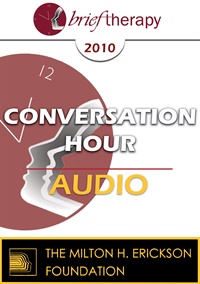
- Average Rating:
- Not yet rated
- Topic Areas:
- Conversation Hours | Marriage
- Categories:
- Brief Therapy Conference | Brief Therapy Conference 2010 | Pioneers in Couples and Family Therapy
- Faculty:
- Michele Weiner-Davis, LCSW
- Duration:
- 1:03:18
- Format:
- Audio Only
- Original Program Date:
- Dec 11, 2010
- Short Description:
- This conversation hour introduces an intensive therapy format designed to help couples regain traction in high-stakes situations. With a focus on building rapport, especially with ambivalent partners, the approach integrates resource-oriented techniques, structured follow-up, and clear therapeutic framing. Themes include infidelity, financial strain, and substance use—offering clinicians practical ways to support relational repair and renewal.
- Price:
- $15.00 - Base Price
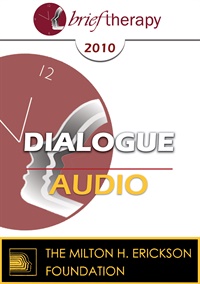
- Average Rating:
- Not yet rated
- Topic Areas:
- Dialogues | Goals of the Therapist | Behavioral Therapy
- Categories:
- Brief Therapy Conference | Brief Therapy Conference 2010
- Faculty:
- Michael Yapko, PhD | James Prochaska, PhD
- Duration:
- 1:00:38
- Format:
- Audio Only
- Original Program Date:
- Dec 11, 2010
- Short Description:
- This dialogue weaves together clinical stories and research to explore how clients can sustain change and prevent relapse. Examples range from smoking cessation in the Air Force to adolescents learning coping skills for stress, showing how readiness, expectancy, and experiential methods influence outcomes. Hear how hypnosis, mindfulness, and feedback can strengthen self-regulation, while goal-setting frameworks help clients progress through stages of change and avoid relapse.
- Price:
- $15.00 - Base Price
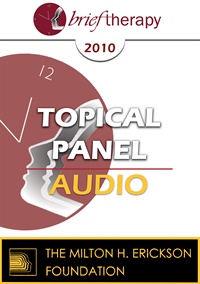
- Average Rating:
- Not yet rated
- Topic Areas:
- Addiction | Topical Panels | Behavioral Psychology | Behavioral Therapy | Identity
- Categories:
- Brief Therapy Conference | Brief Therapy Conference 2010
- Faculty:
- Frank Dattilio, PhD, ABPP | Esther Perel, MA, LMFT | Reid Wilson, PhD
- Duration:
- 59:06
- Format:
- Audio Only
- Original Program Date:
- Dec 11, 2010
- Short Description:
- This panel explores the complex link between anxiety disorders and addiction, with data showing high overlap across conditions like PTSD, GAD, and alcoholism. Reid Wilson stresses the need for simultaneous treatment of both issues. Topics include sexual addiction, cultural influences, and the critical role of family dynamics in recovery. Emphasis is placed on personalized, flexible approaches that reflect the diverse nature of addictive behaviors.
- Price:
- $15.00 - Base Price
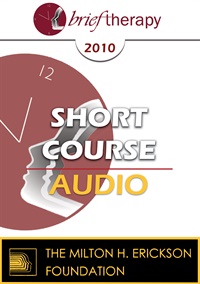
- Average Rating:
- Not yet rated
- Topic Areas:
- Hypnotherapy | Short Courses | Brief Therapy | Ericksonian Hypnosis and Therapy Techniques
- Categories:
- Brief Therapy Conference | Brief Therapy Conference 2010
- Faculty:
- Erika Chovanec, PhD
- Duration:
- 1:03:48
- Format:
- Audio Only
- Original Program Date:
- Dec 09, 2010
- Short Description:
- This workshop will introduce a holistic-motivational approach toward brief therapy, inspired by the work of Abraham Maslow. It will use lecture and demonstrations to show how hypnotherapy can aid in the utilization and encouragement of what Maslow would call Being Motivation and Metavalues in order to create lasting solutions. Participants will also learn specific forms of Ericksonian communication that may enhance Being Motivation and Metavalues.
- Price:
- $15.00 - Base Price
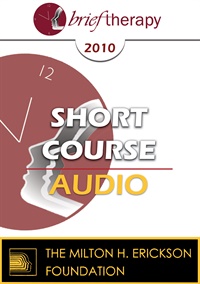
- Average Rating:
- Not yet rated
- Topic Areas:
- Short Courses | Brief Therapy | Burnout | Motivation
- Categories:
- Brief Therapy Conference | Brief Therapy Conference 2010
- Faculty:
- Neil Fiore, PhD
- Duration:
- 1:34:16
- Format:
- Audio Only
- Original Program Date:
- Dec 09, 2010
- Short Description:
- Clients who procrastinate feel stuck, lack motivation, and reveal their ambivalence by stating “I have to finish all this work but I don’t want to.” This workshop builds self-efficacy by integrating conflicting parts with the Prefrontal Cortex Executive Function of choice. Optimal Performance and desensitization techniques focus clients on “choosing when to start,” separating self-worth from work, and planning alternatives to avoidant behaviors.
- Price:
- $15.00 - Base Price
Tags: Procrastination Burnout Motivation
- Average Rating:
- Not yet rated
- Topic Areas:
- Clinical Demonstrations | Psychotherapy | Relationships | Therapeutic Relationship | Motivation | Goals of the Therapist
- Categories:
- Evolution of Psychotherapy | Evolution of Psychotherapy 2009
- Faculty:
- Erving Polster, PhD
- Course Levels:
- Master Degree or Higher in Health-Related Field
- Duration:
- 59:32
- Format:
- Audio and Video
- Original Program Date:
- Dec 11, 2009
- Short Description:
- Educational Objectives: To describe how “immediate nextness”, followed continuingly, will lead to the achievement of therapeutic goals. To describe how absorbed relationship is a leavening process for the increased motivation of clients.
- Price:
-
Sale is $29.00
price reduced from Base Price - $59.00
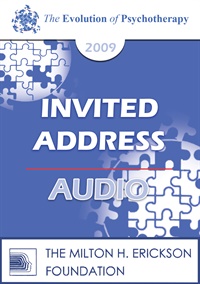
- Average Rating:
- Not yet rated
- Topic Areas:
- Invited Addresses | Eating Disorders | Psychotherapy | Weight Loss | Cognitive Behavior Therapy (CBT)
- Categories:
- Evolution of Psychotherapy | Evolution of Psychotherapy 2009
- Faculty:
- Judith Beck, PhD
- Duration:
- 58 Minutes
- Format:
- Audio Only
- Original Program Date:
- Dec 11, 2009
- Short Description:
- A comprehensive, clinically grounded look at cognitive therapy for overweight and obesity. Participants learn how thoughts, expectations, and daily habits drive eating behavior, and how tools like coping cards, planned eating, and cognitive restructuring support sustainable weight loss and maintenance. The session integrates research, real-world clinical strategies, and practical examples, showing how cognitive therapy moves beyond diet advice to help people build lifelong skills for managing cravings, setbacks, and motivation.
- Price:
- $15.00 - Base Price
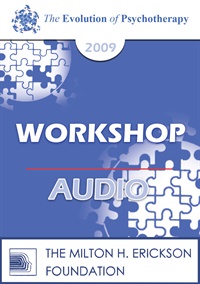
- Average Rating:
- Not yet rated
- Topic Areas:
- Couples Therapy | Workshops | Psychotherapy | Conflict | Marriage
- Categories:
- Evolution of Psychotherapy | Evolution of Psychotherapy 2009 | Pioneers in Couples and Family Therapy
- Faculty:
- Michele Weiner-Davis, LCSW
- Duration:
- 2 Hours 11 Minutes
- Format:
- Audio Only
- Original Program Date:
- Dec 09, 2009
- Short Description:
- This workshop outlines practical strategies for helping couples on the brink of divorce, even when one partner already wants out. Weiner-Davis draws from her Divorce Busting model to demonstrate how hope, directive coaching, and solution-focused interventions can revive connection. She shares how working with one partner can shift dynamics, offers strategies for navigating infidelity, and focuses on honoring emotional pain while guiding couples toward concrete steps forward.
- Price:
- $15.00 - Base Price
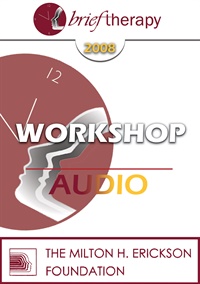
- Average Rating:
- Not yet rated
- Topic Areas:
- Workshops | Brief Therapy | Motivation | Psychotherapy
- Categories:
- Brief Therapy Conference | Brief Therapy Conference 2008
- Faculty:
- Bill O'Hanlon, MS
- Duration:
- 1:52:21
- Format:
- Audio Only
- Original Program Date:
- Dec 14, 2008
- Short Description:
- "If you want truly to understand something, try to change it." - Kurt Lewin. Change is one of the most challenging aspects of life. Yet there are identifiable ways we all change. In this short session, you will learn the seven major ways people change and how to identify and tap into people's natural motivational styles to create change.
- Price:
- $15.00 - Base Price
- Average Rating:
- Not yet rated
- Topic Areas:
- Clinical Demonstrations | Cognitive Behavior Therapy (CBT) | Eating Disorders | Weight Loss
- Categories:
- Brief Therapy Conference | Brief Therapy Conference 2008
- Faculty:
- Judith Beck, PhD
- Course Levels:
- Master Degree or Higher in Health-Related Field
- Duration:
- 56:42
- Format:
- Audio and Video
- Original Program Date:
- Dec 13, 2008
- Short Description:
- A detailed, practical look at using cognitive behavioral strategies to support weight loss and long-term maintenance. Participants observe how clear structure, skill-building, and moment-to-moment coaching help clients manage cravings, reduce unplanned eating, and shift long-standing patterns around food, guilt, and self-control. The session shows how tools like daily motivation practice, planned flexibility, and “no choice” thinking can strengthen follow-through and help clients build a sustainable relationship with eating rather than cycling through diets.
- Price:
-
Sale is $29.00
price reduced from Base Price - $59.00
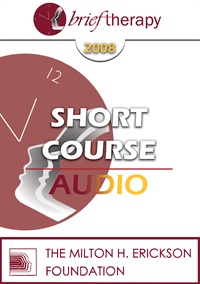
- Average Rating:
- Not yet rated
- Topic Areas:
- Short Courses | Interviewing | Solution Oriented Approach | Brief Therapy | Motivation
- Categories:
- Brief Therapy Conference | Brief Therapy Conference 2008
- Faculty:
- Lindasue Marshall, LCSW | Ernest Marshall, MSW
- Duration:
- 1:29:49
- Format:
- Audio Only
- Original Program Date:
- Dec 11, 2008
- Short Description:
- Interventions often fail because the client is not yet truly motivated for change. Motivational interviewing elicits intrinsic motivation and is highly effective in conjunction with Solution Focused Brief Therapy (SFBT). Participants will recognize language demonstrating readiness for change and learn how to integrate SFBT interventions to bring about lasting change.
- Price:
- $15.00 - Base Price
- Average Rating:
- Not yet rated
- Topic Areas:
- State of the Art Address | Motivation | Psychotherapy | Therapist Development
- Categories:
- Evolution of Psychotherapy | Evolution of Psychotherapy 2005
- Faculty:
- Albert Bandura
- Course Levels:
- Master Degree or Higher in Health-Related Field
- Duration:
- 55:39
- Format:
- Audio and Video
- Original Program Date:
- Dec 09, 2005
- Short Description:
- This address will focus on self-efficacy as the foundation of human motivation, well-being and accomplishments. Whatever other factors may serve as guides and motivators, they are rooted in the core belief that one has the power to effect changes. This address will analyze the source of people's beliefs in their efficacy, their cognitive, motivational and emotional effects, and how to build a resilient sense of efficacy for personal and social betterment.
- Price:
-
Sale is $29.00
price reduced from Base Price - $59.00


